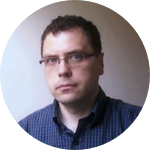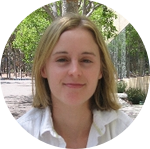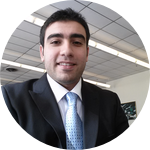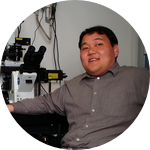Project Results
When a healthy person suffers from a cut or a burn, immune system cells rush to the damaged area to repair. One of the most important of these defenders is the neutrophil — a type of white blood cell that moves quickly to gobble up bacteria that can cause infection. One of the greatest challenges in helping patients recover from infection is that we still don’t understand how our own immune cells do this effectively, why these immune cells sometimes fail, and how to improve the immune response. So last year, my colleagues and I had a novel idea: what if we created a contest, a cellular race, where top scientists from the US and Europe competed to design a new, super-cell that could be faster and smarter than all cells used in the lab? Our results showed that not only could we engineer a better cell, but that this contest approach helped spread new techniques and knowledge. The winners from the first ever Dicty cell race demonstrated new techniques that could improve developments in treating burn victims, infectious disease, and cancer.
About This Project
On May 16, Dicty and HL60 cells will race for the "fastest & smartest" title. Both cell types are models for studying human neutrophils, the white blood cells protecting us from infections. Neutrophils are often perturbed during disease and today we have no drugs to correct their migration when that happens. We recruited 20 of the top science labs around the world to fine-tune the cells for the Race, but only one will win the Great Prize of $5,000.Ask the Scientists
Join The DiscussionWhat is the context of this research?
Every cell in the body moves. Sometimes, cell movement helps
preserve our health. For example, neutrophils protect us against infections by moving quickly from blood into the wounds. Other times, cell movement is a problem. For example, neutrophils can exacerbate the pain and tissue destruction when they enter joint tissues during arthritis. Cancer cells can give rise to distant metastases, which are the cause of death in 90% of the cancer patients, when they leave a tumor. Considering the importance of cell movement in health and disease, one would think that we already have many drugs to accelerate or slow down cells movement, depending on the circumstances. However, this is hardly the case. Today, we know a lot about the molecules involved in cell movement. However, we understand less about how these molecules work together. Thus, the more we learn about how to speed up moving cells, the better we understand the mechanisms of cell migration, and better the chances that such drugs will eventually emerge.
What is the significance of this project?
One of our goals is to correct the slower and disoriented
neutrophils from patients with burn injuries. However, human neutrophils are very difficult to study using traditional molecular biology tools. It is much easier to study one of the two model cells, Dicty and HL60. Why this is, you could read more in our lab notes. Enabled by microfluidic devices designed in our lab, very precise measurements of speed and orientation are now possible. Compared to the neutrophils from healthy persons, Dicty cells shine in precision but lag in speed, whereas HL60s are good sprinters but lag in precision. These deficits are comparable to those of the neutrophils from patients with large burn injuries. Thus, we have asked scientists around the world to take a first shot at this problem and send us their fastest and smartest Dicty and HL60 cells.
What are the goals of the project?
At the end of the Race we will have in our hands Dicty and HL60 cells that are the fastest and smartest . These cells will be the starting point for a reverse-engineering process that will ultimately lead to new ways to correct the motility of human neutrophils in conditions when their performance is deteriorated and the body looses the ability to fight infections.
Twenty teams of scientists signed up for the Race. Half of them are from the US, half from Europe. You could read more about these teams in our lab notes.
Right now, the teams are working hard to fine tune their cells through preliminary runs using devices that we shipped to their labs. On the day of the Race, May 16, 2014, we will run these cells through mazes and post movies online for everyone to see who will be the winners!
Budget
The preparations for first ever "Dicty World Race" are well underway and the winner will have, without question, the rights to brag about winning the Race among peers. So then why cash prizes?
Prizes are the feedback you are giving to show that you care about the goals of the race as much as we do. Your feedback can stimulate creativity, attract scientists from other fields with fresh perspectives of the problem of cell migration, or motivate students to take on a fun science project and stick to research for a career.
All your donations will go to the research laboratory of the winning team. A big prize of $5,000 will be awarded to the team sending us the fastest and smartest cells, to be used for research, new equipment, and travel to conferences.
Depending on your generosity, special prizes of $1,000 for the fastest (no matter how smart) or the smartest (no matter how slow) cells will also be considered. We may give a consolation prize for the clumsiest cells, because there is always something to learn from every struggle.
Pick your favorite team (click on this link or check out our lab note from April 7) and let the scientists know of your support !
Endorsed by
Meet the Team
Team Bio
I am a scientist trained as a physician and pursuing the goal of engineering better tools for measuring cell motility in health and disease. For the past 10 years I led many projects designing better microfluidic devices to measure neutrophil motility with high accuracy in patients with burn injury, and employing these measurements to uncover potential treatments to correct the defects of neutrophil motility and restore protection against infections. Recently we designed the first device to study retrotaxis in vitro, relevant to the resolution of inflammation. Most recently, we designed microfluidic devices to measure neutrophils motility directly from one small droplet of blood quickly, robustly, without the need for neutrophil separation, and with better precision than ever before. By organizing the Dicty World Race I hope to encourage the engineering of better tools for measuring cell motility.Christopher Janetopoulos
I am interested in cell migration, cancer, and the brain.
I develop imaging tools so that we can see inside cells and organisms.
Monica Skoge
Physicist with a focus on quantitative biology, combining both experimental and computational approaches. Currently working to elucidate the dynamical systems underlying eukaryotic cell motility and chemotaxis with potential applications to inflammatory diseases and cancer.
Press and Media
Read the news about the results of the race:Nature blog
Boston Globe
Read the editorial in Nature: The game is on
The first ever Dicty featured on the front page of Wall Street Journal !!

========================================================
OUR SPONSORS

K2 Therapeutics, Inc. is a venture backed life science company focused on developing breakthrough drugs to treat life threatening fungal infections. Founded in 2012, the K2 pipeline includes novel targeted antifungal immunotherapies which redirect the immune system to the site of invasive fungal infection to help clear disease.
MicroMedicine is developing microfluidic technologies and bringing them to clinical settings. The technology enables pristine separation of blood cells for use in infection imaging and tissue regeneration.
MatTek is the world’s largest independent producer of in vitro Normal Human 3-D (NHu-3D) tissue models and glass bottom dishes.
Formedium Ltd. is a producer of powdered Dictyostelium discoideum Culture media, of excellent quality at very competitive prices. www.formedium.com.
The BioMEMS Resource Center at the Massachusetts General Hospital brings together engineers, scientists and clinical investigators towards the goal of developing novel microsystems technologies for clinical applications and biological discovery.
=======================================================
Our local research community is very supportive and cheering up from the side lines.

We are in the news on the American Society for Cell Biology news website.

The Society for Leukocyte Biology is helping us spread the news about the Dicty World Race.

Earlier Races:
Science in Schools: Making the right moves
The winners of the 2013 World Cell Race
Wired Magazine: A short essay from David MacNeal about our Cancer Cell Race in the Fall of 2013
Chemical and Engineering News: Cellular NASCAR Nature: World's first Cell Race 2011
Read more about how biotic games can help advance biotechnology research

Why do we need to restore neutrophil migration in patients with burn injuries.
Additional Information
Thanks to Jonny Chang and ASCB for the logo image.Check out what people think about who the likely winner of the Dicty Race will be : www.scicast.org - a crowdsourced forecasting platform for predictions in Science and Technology.

The team organizing the Dicty World Cell Race is led by Daniel Irimia, MD, PhD (Assistant Professor at Harvard Medical School) and includes Monica Skoge, PhD (Postdoctoral Fellow at the University of California San Diego), Chris Janetopoulos, PhD (Assistant Professor at Vanderbilt University), Elisabeth Wong (Research Engineer at the Massachusetts General Hospital), Bashar Hamza, MS (Research Engineer at the Massachusetts General Hospital), Albert Bae, PhD (Postdoctoral Fellow at the University of California San Diego), and Joe Martel, PhD (Postdoctoral fellow at the Massachusetts General Hospital).
Project Backers
- 13Backers
- 100%Funded
- $5,001Total Donations
- $192.39Average Donation







